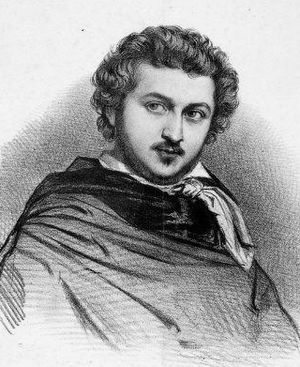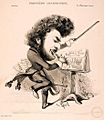Louis Antoine Jullien facts for kids
Louis Antoine Jullien (born April 23, 1812 – died March 14, 1860) was a famous French conductor. He was well-known for his exciting and dramatic performances.
Contents
Life of a Showman Conductor
Early Years and Musical Start
Jullien was born in Sisteron, a town in the French Alps. When he was baptized, he had 36 godparents and was given 36 Christian names!
He studied music at the Paris Conservatoire. He was a good musician, but he especially loved popular dance music. He started his own band. However, he had to leave Paris because he had many money problems.
His Career in England
Jullien moved to London and created a great orchestra. His orchestra played at popular summer concerts, called Concerts d’été. Later, he also led winter concerts, known as Concerts d’hiver.
Even though he was a skilled conductor, he was an even bigger showman! He made a big deal out of putting on his white gloves, which were brought to him on a silver plate. When he conducted music by Beethoven, he used a special baton (conductor’s stick) that had jewels on it. He wore a white waistcoat and huge wristbands. He also had a very big moustache and long, black hair.
During his performances, he would move around a lot. He would even throw himself around while conducting. He always finished by sinking into a soft velvet chair. The audience loved his shows, especially when he added military bands to his orchestra. He often conducted while facing the audience, not just the orchestra. He led many concerts in London's theatres and parks. These were known as promenade concerts.
Jullien’s concerts included pieces by famous composers like Beethoven and Mozart. But he always mixed them with lighter music. This included dances, quadrilles, and marches. He often added many extra instruments to classic pieces. For example, when he conducted Beethoven’s Fifth Symphony, he added four ophicleides, a saxophone, and side drums.
Jullien traveled with his orchestra to Scotland, Ireland, and America. In 1852, he put on an opera called Pietro il grande at Covent Garden. But it cost so much money that he lost everything he had.
His Final Years
Eventually, Jullien went back to France. There, he faced serious debts and was put into a special hospital. He died in 1860. His wife, whom he was happily married to, lived for many more years. Their son, Louis, also became a conductor and tried to lead promenade concerts. However, he did not have as much success as his father.
His Legacy and Influence
Jullien’s way of conducting might seem unusual to us today. But he lived at a time when conductors were becoming very important. Orchestras were much larger than they had been in the 18th century.
He gave many people who had never heard good classical music a chance to enjoy it. He had a big influence on the music scene in London. People talked about his exciting performances for many years after he passed away.
Images for kids
See also
 In Spanish: Louis-Antoine Jullien para niños
In Spanish: Louis-Antoine Jullien para niños
 | William L. Dawson |
 | W. E. B. Du Bois |
 | Harry Belafonte |



